PUBH306: Advocacy and Policy Change for Refugee Mental Healthcare
VerifiedAdded on 2022/11/26
|8
|2130
|75
Report
AI Summary
This report focuses on developing an advocacy strategy for refugees in Australia, specifically addressing limitations in mental healthcare services. It examines the adverse impacts of government policies on refugees, including the effects of offshore detention and restricted access to mental health services. The report outlines the role of an advocacy officer, proposes alternative policy options to improve healthcare access, and highlights the contributions of NGOs in public debates. The advocacy strategy emphasizes the importance of screening, integration of mental health professionals, and the avoidance of offshore detention. The report concludes by summarizing the advocacy efforts, the proposed policy changes, and the role of NGOs in supporting refugee mental healthcare, advocating for a more equitable approach to mental health services for refugees.
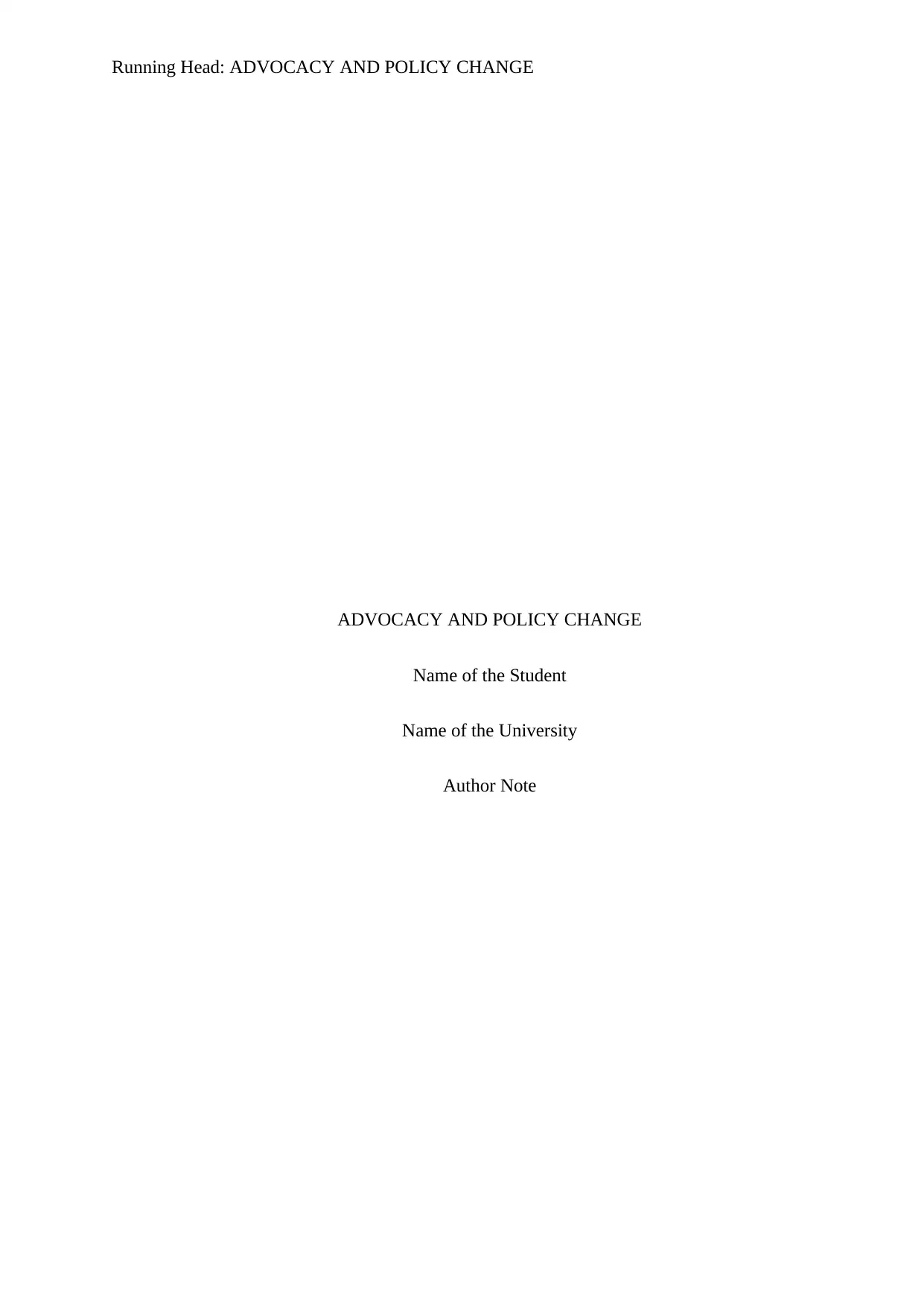
Running Head: ADVOCACY AND POLICY CHANGE
ADVOCACY AND POLICY CHANGE
Name of the Student
Name of the University
Author Note
ADVOCACY AND POLICY CHANGE
Name of the Student
Name of the University
Author Note
Paraphrase This Document
Need a fresh take? Get an instant paraphrase of this document with our AI Paraphraser
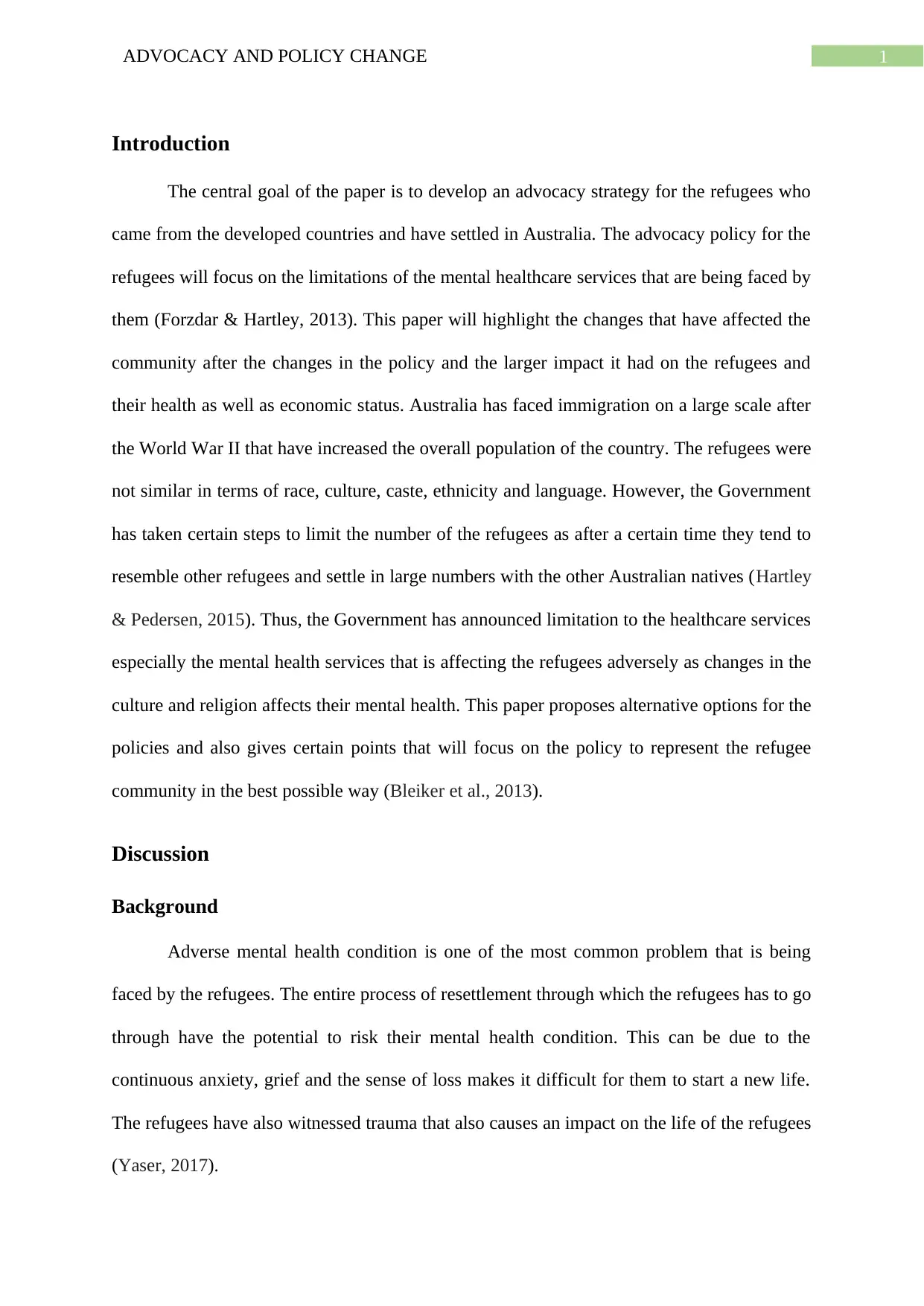
1ADVOCACY AND POLICY CHANGE
Introduction
The central goal of the paper is to develop an advocacy strategy for the refugees who
came from the developed countries and have settled in Australia. The advocacy policy for the
refugees will focus on the limitations of the mental healthcare services that are being faced by
them (Forzdar & Hartley, 2013). This paper will highlight the changes that have affected the
community after the changes in the policy and the larger impact it had on the refugees and
their health as well as economic status. Australia has faced immigration on a large scale after
the World War II that have increased the overall population of the country. The refugees were
not similar in terms of race, culture, caste, ethnicity and language. However, the Government
has taken certain steps to limit the number of the refugees as after a certain time they tend to
resemble other refugees and settle in large numbers with the other Australian natives (Hartley
& Pedersen, 2015). Thus, the Government has announced limitation to the healthcare services
especially the mental health services that is affecting the refugees adversely as changes in the
culture and religion affects their mental health. This paper proposes alternative options for the
policies and also gives certain points that will focus on the policy to represent the refugee
community in the best possible way (Bleiker et al., 2013).
Discussion
Background
Adverse mental health condition is one of the most common problem that is being
faced by the refugees. The entire process of resettlement through which the refugees has to go
through have the potential to risk their mental health condition. This can be due to the
continuous anxiety, grief and the sense of loss makes it difficult for them to start a new life.
The refugees have also witnessed trauma that also causes an impact on the life of the refugees
(Yaser, 2017).
Introduction
The central goal of the paper is to develop an advocacy strategy for the refugees who
came from the developed countries and have settled in Australia. The advocacy policy for the
refugees will focus on the limitations of the mental healthcare services that are being faced by
them (Forzdar & Hartley, 2013). This paper will highlight the changes that have affected the
community after the changes in the policy and the larger impact it had on the refugees and
their health as well as economic status. Australia has faced immigration on a large scale after
the World War II that have increased the overall population of the country. The refugees were
not similar in terms of race, culture, caste, ethnicity and language. However, the Government
has taken certain steps to limit the number of the refugees as after a certain time they tend to
resemble other refugees and settle in large numbers with the other Australian natives (Hartley
& Pedersen, 2015). Thus, the Government has announced limitation to the healthcare services
especially the mental health services that is affecting the refugees adversely as changes in the
culture and religion affects their mental health. This paper proposes alternative options for the
policies and also gives certain points that will focus on the policy to represent the refugee
community in the best possible way (Bleiker et al., 2013).
Discussion
Background
Adverse mental health condition is one of the most common problem that is being
faced by the refugees. The entire process of resettlement through which the refugees has to go
through have the potential to risk their mental health condition. This can be due to the
continuous anxiety, grief and the sense of loss makes it difficult for them to start a new life.
The refugees have also witnessed trauma that also causes an impact on the life of the refugees
(Yaser, 2017).
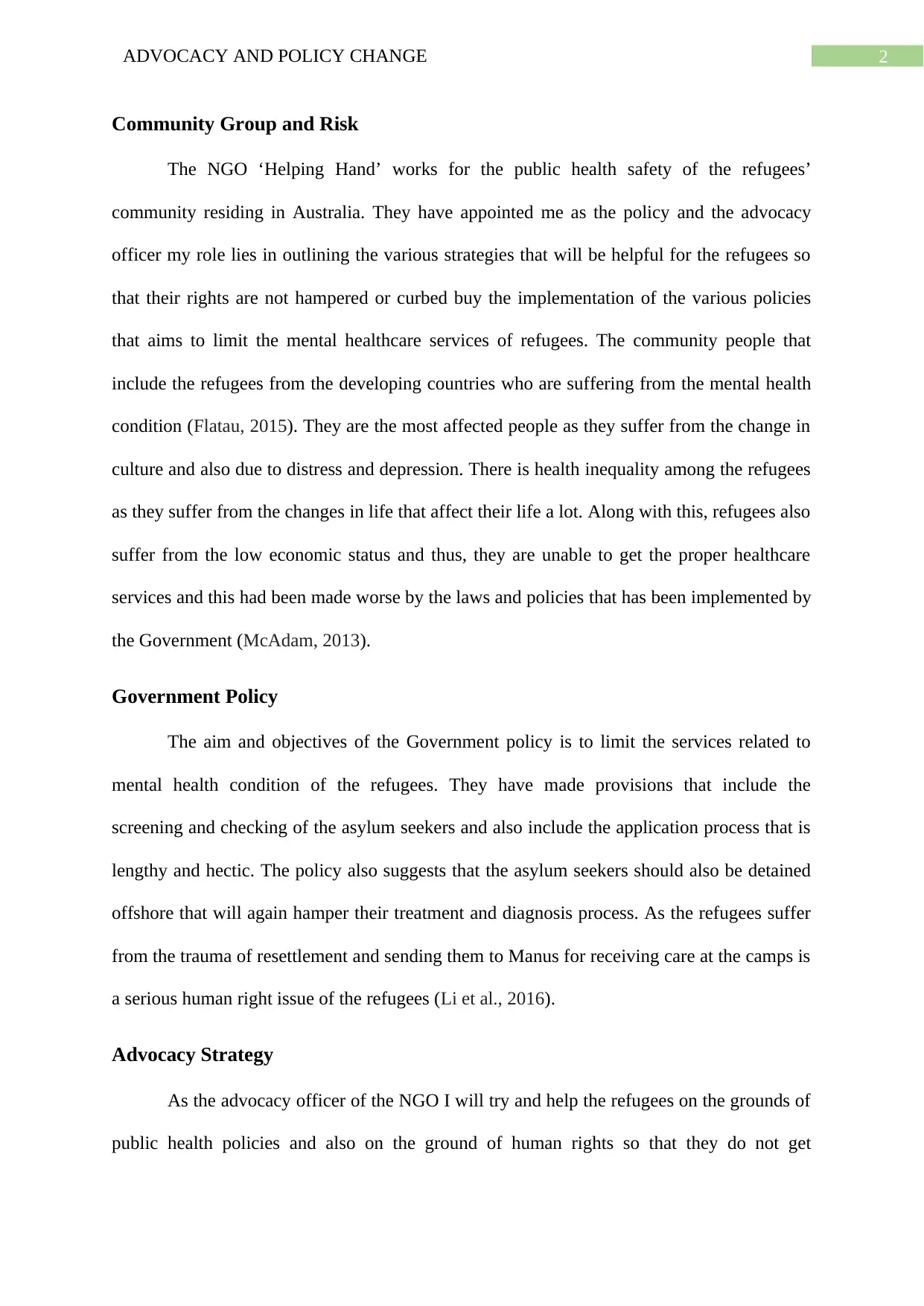
2ADVOCACY AND POLICY CHANGE
Community Group and Risk
The NGO ‘Helping Hand’ works for the public health safety of the refugees’
community residing in Australia. They have appointed me as the policy and the advocacy
officer my role lies in outlining the various strategies that will be helpful for the refugees so
that their rights are not hampered or curbed buy the implementation of the various policies
that aims to limit the mental healthcare services of refugees. The community people that
include the refugees from the developing countries who are suffering from the mental health
condition (Flatau, 2015). They are the most affected people as they suffer from the change in
culture and also due to distress and depression. There is health inequality among the refugees
as they suffer from the changes in life that affect their life a lot. Along with this, refugees also
suffer from the low economic status and thus, they are unable to get the proper healthcare
services and this had been made worse by the laws and policies that has been implemented by
the Government (McAdam, 2013).
Government Policy
The aim and objectives of the Government policy is to limit the services related to
mental health condition of the refugees. They have made provisions that include the
screening and checking of the asylum seekers and also include the application process that is
lengthy and hectic. The policy also suggests that the asylum seekers should also be detained
offshore that will again hamper their treatment and diagnosis process. As the refugees suffer
from the trauma of resettlement and sending them to Manus for receiving care at the camps is
a serious human right issue of the refugees (Li et al., 2016).
Advocacy Strategy
As the advocacy officer of the NGO I will try and help the refugees on the grounds of
public health policies and also on the ground of human rights so that they do not get
Community Group and Risk
The NGO ‘Helping Hand’ works for the public health safety of the refugees’
community residing in Australia. They have appointed me as the policy and the advocacy
officer my role lies in outlining the various strategies that will be helpful for the refugees so
that their rights are not hampered or curbed buy the implementation of the various policies
that aims to limit the mental healthcare services of refugees. The community people that
include the refugees from the developing countries who are suffering from the mental health
condition (Flatau, 2015). They are the most affected people as they suffer from the change in
culture and also due to distress and depression. There is health inequality among the refugees
as they suffer from the changes in life that affect their life a lot. Along with this, refugees also
suffer from the low economic status and thus, they are unable to get the proper healthcare
services and this had been made worse by the laws and policies that has been implemented by
the Government (McAdam, 2013).
Government Policy
The aim and objectives of the Government policy is to limit the services related to
mental health condition of the refugees. They have made provisions that include the
screening and checking of the asylum seekers and also include the application process that is
lengthy and hectic. The policy also suggests that the asylum seekers should also be detained
offshore that will again hamper their treatment and diagnosis process. As the refugees suffer
from the trauma of resettlement and sending them to Manus for receiving care at the camps is
a serious human right issue of the refugees (Li et al., 2016).
Advocacy Strategy
As the advocacy officer of the NGO I will try and help the refugees on the grounds of
public health policies and also on the ground of human rights so that they do not get
⊘ This is a preview!⊘
Do you want full access?
Subscribe today to unlock all pages.

Trusted by 1+ million students worldwide
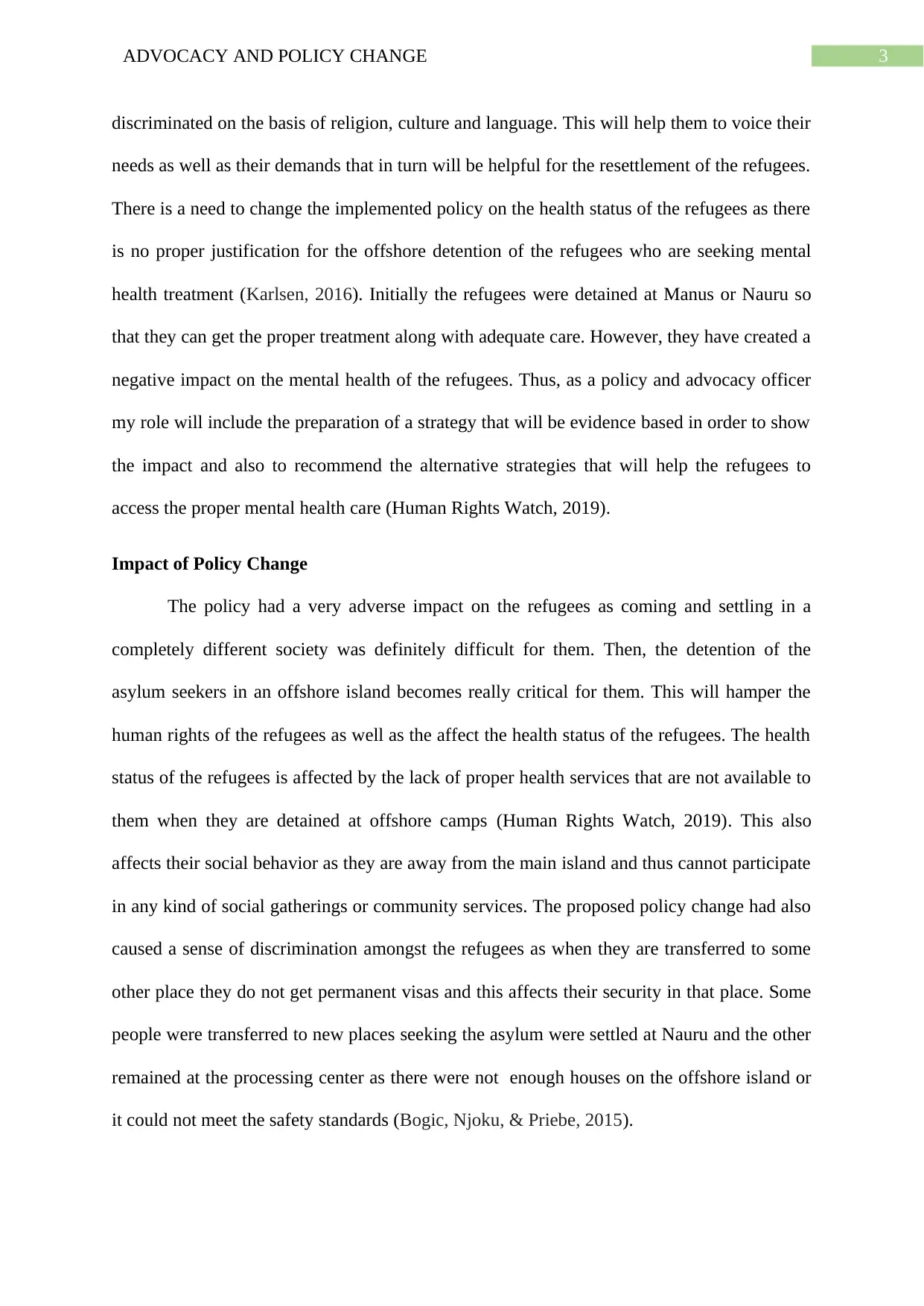
3ADVOCACY AND POLICY CHANGE
discriminated on the basis of religion, culture and language. This will help them to voice their
needs as well as their demands that in turn will be helpful for the resettlement of the refugees.
There is a need to change the implemented policy on the health status of the refugees as there
is no proper justification for the offshore detention of the refugees who are seeking mental
health treatment (Karlsen, 2016). Initially the refugees were detained at Manus or Nauru so
that they can get the proper treatment along with adequate care. However, they have created a
negative impact on the mental health of the refugees. Thus, as a policy and advocacy officer
my role will include the preparation of a strategy that will be evidence based in order to show
the impact and also to recommend the alternative strategies that will help the refugees to
access the proper mental health care (Human Rights Watch, 2019).
Impact of Policy Change
The policy had a very adverse impact on the refugees as coming and settling in a
completely different society was definitely difficult for them. Then, the detention of the
asylum seekers in an offshore island becomes really critical for them. This will hamper the
human rights of the refugees as well as the affect the health status of the refugees. The health
status of the refugees is affected by the lack of proper health services that are not available to
them when they are detained at offshore camps (Human Rights Watch, 2019). This also
affects their social behavior as they are away from the main island and thus cannot participate
in any kind of social gatherings or community services. The proposed policy change had also
caused a sense of discrimination amongst the refugees as when they are transferred to some
other place they do not get permanent visas and this affects their security in that place. Some
people were transferred to new places seeking the asylum were settled at Nauru and the other
remained at the processing center as there were not enough houses on the offshore island or
it could not meet the safety standards (Bogic, Njoku, & Priebe, 2015).
discriminated on the basis of religion, culture and language. This will help them to voice their
needs as well as their demands that in turn will be helpful for the resettlement of the refugees.
There is a need to change the implemented policy on the health status of the refugees as there
is no proper justification for the offshore detention of the refugees who are seeking mental
health treatment (Karlsen, 2016). Initially the refugees were detained at Manus or Nauru so
that they can get the proper treatment along with adequate care. However, they have created a
negative impact on the mental health of the refugees. Thus, as a policy and advocacy officer
my role will include the preparation of a strategy that will be evidence based in order to show
the impact and also to recommend the alternative strategies that will help the refugees to
access the proper mental health care (Human Rights Watch, 2019).
Impact of Policy Change
The policy had a very adverse impact on the refugees as coming and settling in a
completely different society was definitely difficult for them. Then, the detention of the
asylum seekers in an offshore island becomes really critical for them. This will hamper the
human rights of the refugees as well as the affect the health status of the refugees. The health
status of the refugees is affected by the lack of proper health services that are not available to
them when they are detained at offshore camps (Human Rights Watch, 2019). This also
affects their social behavior as they are away from the main island and thus cannot participate
in any kind of social gatherings or community services. The proposed policy change had also
caused a sense of discrimination amongst the refugees as when they are transferred to some
other place they do not get permanent visas and this affects their security in that place. Some
people were transferred to new places seeking the asylum were settled at Nauru and the other
remained at the processing center as there were not enough houses on the offshore island or
it could not meet the safety standards (Bogic, Njoku, & Priebe, 2015).
Paraphrase This Document
Need a fresh take? Get an instant paraphrase of this document with our AI Paraphraser
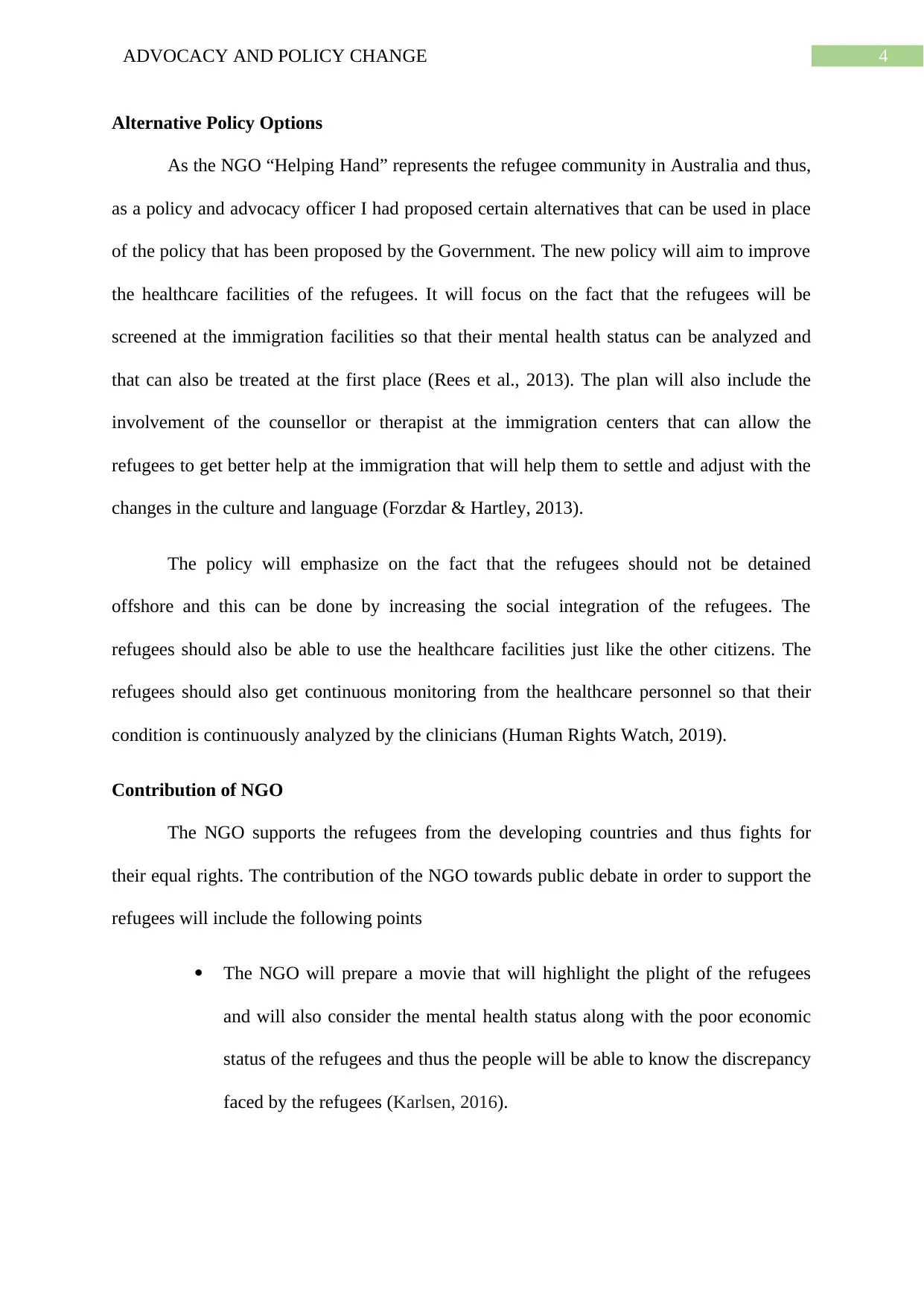
4ADVOCACY AND POLICY CHANGE
Alternative Policy Options
As the NGO “Helping Hand” represents the refugee community in Australia and thus,
as a policy and advocacy officer I had proposed certain alternatives that can be used in place
of the policy that has been proposed by the Government. The new policy will aim to improve
the healthcare facilities of the refugees. It will focus on the fact that the refugees will be
screened at the immigration facilities so that their mental health status can be analyzed and
that can also be treated at the first place (Rees et al., 2013). The plan will also include the
involvement of the counsellor or therapist at the immigration centers that can allow the
refugees to get better help at the immigration that will help them to settle and adjust with the
changes in the culture and language (Forzdar & Hartley, 2013).
The policy will emphasize on the fact that the refugees should not be detained
offshore and this can be done by increasing the social integration of the refugees. The
refugees should also be able to use the healthcare facilities just like the other citizens. The
refugees should also get continuous monitoring from the healthcare personnel so that their
condition is continuously analyzed by the clinicians (Human Rights Watch, 2019).
Contribution of NGO
The NGO supports the refugees from the developing countries and thus fights for
their equal rights. The contribution of the NGO towards public debate in order to support the
refugees will include the following points
The NGO will prepare a movie that will highlight the plight of the refugees
and will also consider the mental health status along with the poor economic
status of the refugees and thus the people will be able to know the discrepancy
faced by the refugees (Karlsen, 2016).
Alternative Policy Options
As the NGO “Helping Hand” represents the refugee community in Australia and thus,
as a policy and advocacy officer I had proposed certain alternatives that can be used in place
of the policy that has been proposed by the Government. The new policy will aim to improve
the healthcare facilities of the refugees. It will focus on the fact that the refugees will be
screened at the immigration facilities so that their mental health status can be analyzed and
that can also be treated at the first place (Rees et al., 2013). The plan will also include the
involvement of the counsellor or therapist at the immigration centers that can allow the
refugees to get better help at the immigration that will help them to settle and adjust with the
changes in the culture and language (Forzdar & Hartley, 2013).
The policy will emphasize on the fact that the refugees should not be detained
offshore and this can be done by increasing the social integration of the refugees. The
refugees should also be able to use the healthcare facilities just like the other citizens. The
refugees should also get continuous monitoring from the healthcare personnel so that their
condition is continuously analyzed by the clinicians (Human Rights Watch, 2019).
Contribution of NGO
The NGO supports the refugees from the developing countries and thus fights for
their equal rights. The contribution of the NGO towards public debate in order to support the
refugees will include the following points
The NGO will prepare a movie that will highlight the plight of the refugees
and will also consider the mental health status along with the poor economic
status of the refugees and thus the people will be able to know the discrepancy
faced by the refugees (Karlsen, 2016).
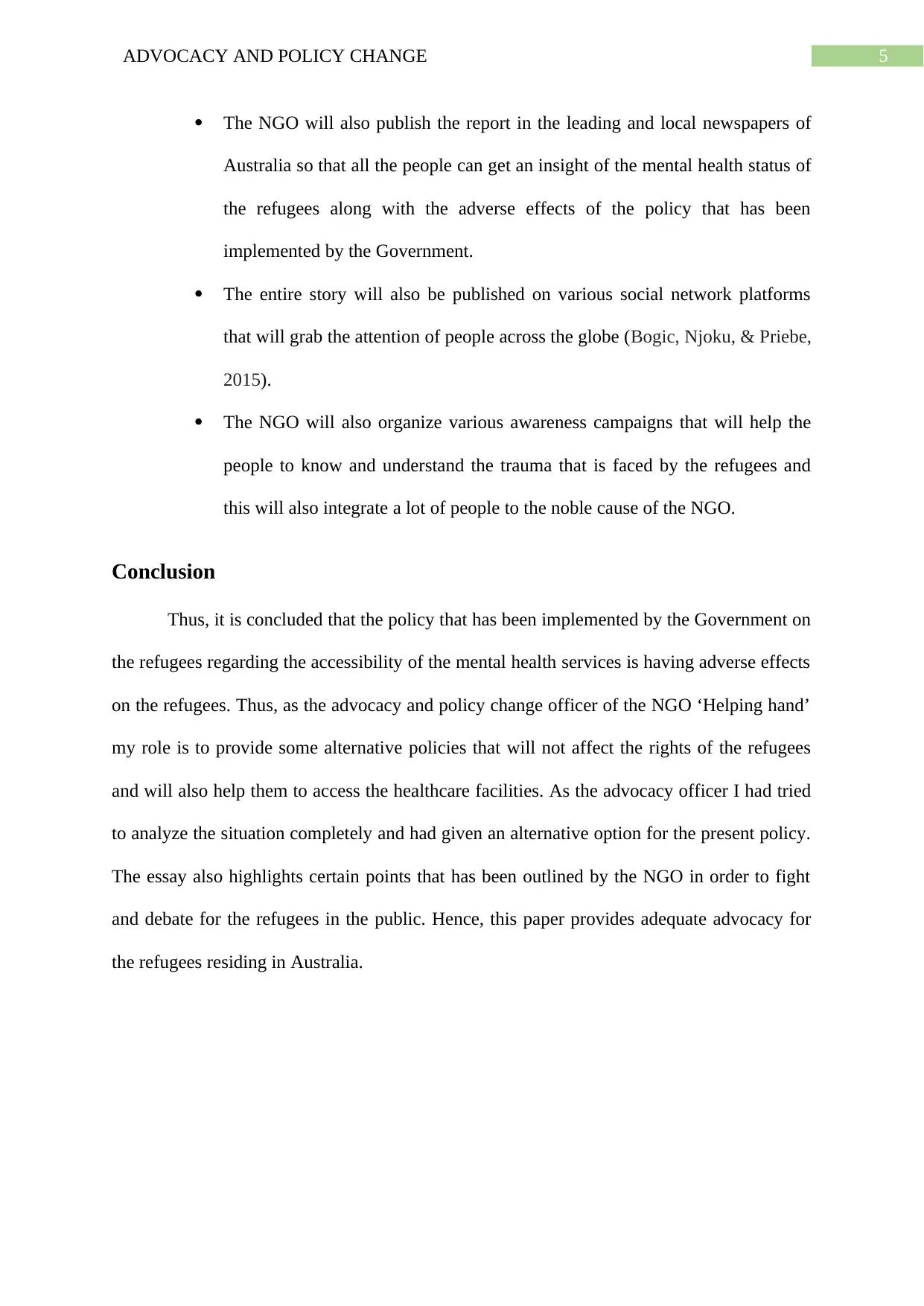
5ADVOCACY AND POLICY CHANGE
The NGO will also publish the report in the leading and local newspapers of
Australia so that all the people can get an insight of the mental health status of
the refugees along with the adverse effects of the policy that has been
implemented by the Government.
The entire story will also be published on various social network platforms
that will grab the attention of people across the globe (Bogic, Njoku, & Priebe,
2015).
The NGO will also organize various awareness campaigns that will help the
people to know and understand the trauma that is faced by the refugees and
this will also integrate a lot of people to the noble cause of the NGO.
Conclusion
Thus, it is concluded that the policy that has been implemented by the Government on
the refugees regarding the accessibility of the mental health services is having adverse effects
on the refugees. Thus, as the advocacy and policy change officer of the NGO ‘Helping hand’
my role is to provide some alternative policies that will not affect the rights of the refugees
and will also help them to access the healthcare facilities. As the advocacy officer I had tried
to analyze the situation completely and had given an alternative option for the present policy.
The essay also highlights certain points that has been outlined by the NGO in order to fight
and debate for the refugees in the public. Hence, this paper provides adequate advocacy for
the refugees residing in Australia.
The NGO will also publish the report in the leading and local newspapers of
Australia so that all the people can get an insight of the mental health status of
the refugees along with the adverse effects of the policy that has been
implemented by the Government.
The entire story will also be published on various social network platforms
that will grab the attention of people across the globe (Bogic, Njoku, & Priebe,
2015).
The NGO will also organize various awareness campaigns that will help the
people to know and understand the trauma that is faced by the refugees and
this will also integrate a lot of people to the noble cause of the NGO.
Conclusion
Thus, it is concluded that the policy that has been implemented by the Government on
the refugees regarding the accessibility of the mental health services is having adverse effects
on the refugees. Thus, as the advocacy and policy change officer of the NGO ‘Helping hand’
my role is to provide some alternative policies that will not affect the rights of the refugees
and will also help them to access the healthcare facilities. As the advocacy officer I had tried
to analyze the situation completely and had given an alternative option for the present policy.
The essay also highlights certain points that has been outlined by the NGO in order to fight
and debate for the refugees in the public. Hence, this paper provides adequate advocacy for
the refugees residing in Australia.
⊘ This is a preview!⊘
Do you want full access?
Subscribe today to unlock all pages.

Trusted by 1+ million students worldwide
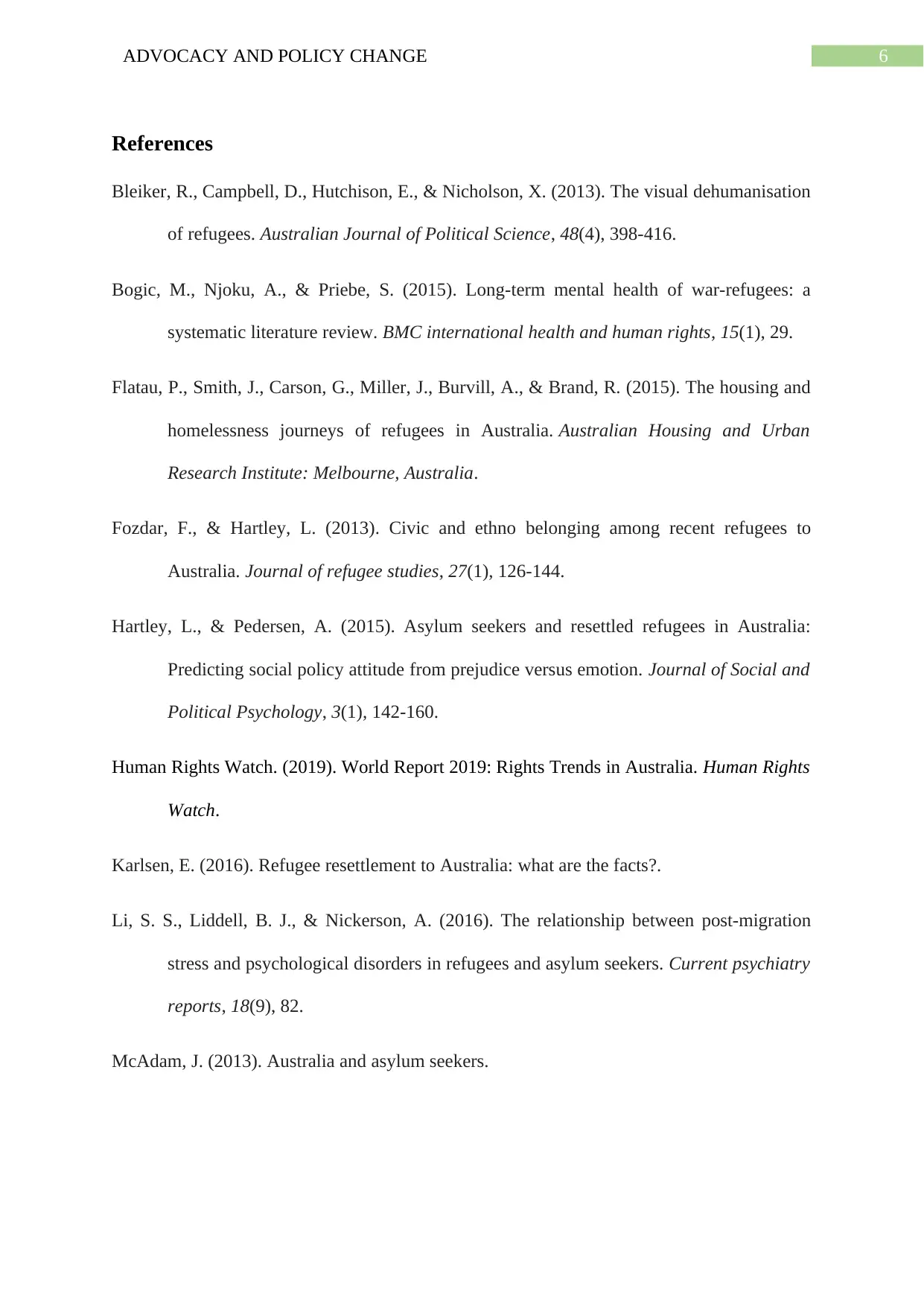
6ADVOCACY AND POLICY CHANGE
References
Bleiker, R., Campbell, D., Hutchison, E., & Nicholson, X. (2013). The visual dehumanisation
of refugees. Australian Journal of Political Science, 48(4), 398-416.
Bogic, M., Njoku, A., & Priebe, S. (2015). Long-term mental health of war-refugees: a
systematic literature review. BMC international health and human rights, 15(1), 29.
Flatau, P., Smith, J., Carson, G., Miller, J., Burvill, A., & Brand, R. (2015). The housing and
homelessness journeys of refugees in Australia. Australian Housing and Urban
Research Institute: Melbourne, Australia.
Fozdar, F., & Hartley, L. (2013). Civic and ethno belonging among recent refugees to
Australia. Journal of refugee studies, 27(1), 126-144.
Hartley, L., & Pedersen, A. (2015). Asylum seekers and resettled refugees in Australia:
Predicting social policy attitude from prejudice versus emotion. Journal of Social and
Political Psychology, 3(1), 142-160.
Human Rights Watch. (2019). World Report 2019: Rights Trends in Australia. Human Rights
Watch.
Karlsen, E. (2016). Refugee resettlement to Australia: what are the facts?.
Li, S. S., Liddell, B. J., & Nickerson, A. (2016). The relationship between post-migration
stress and psychological disorders in refugees and asylum seekers. Current psychiatry
reports, 18(9), 82.
McAdam, J. (2013). Australia and asylum seekers.
References
Bleiker, R., Campbell, D., Hutchison, E., & Nicholson, X. (2013). The visual dehumanisation
of refugees. Australian Journal of Political Science, 48(4), 398-416.
Bogic, M., Njoku, A., & Priebe, S. (2015). Long-term mental health of war-refugees: a
systematic literature review. BMC international health and human rights, 15(1), 29.
Flatau, P., Smith, J., Carson, G., Miller, J., Burvill, A., & Brand, R. (2015). The housing and
homelessness journeys of refugees in Australia. Australian Housing and Urban
Research Institute: Melbourne, Australia.
Fozdar, F., & Hartley, L. (2013). Civic and ethno belonging among recent refugees to
Australia. Journal of refugee studies, 27(1), 126-144.
Hartley, L., & Pedersen, A. (2015). Asylum seekers and resettled refugees in Australia:
Predicting social policy attitude from prejudice versus emotion. Journal of Social and
Political Psychology, 3(1), 142-160.
Human Rights Watch. (2019). World Report 2019: Rights Trends in Australia. Human Rights
Watch.
Karlsen, E. (2016). Refugee resettlement to Australia: what are the facts?.
Li, S. S., Liddell, B. J., & Nickerson, A. (2016). The relationship between post-migration
stress and psychological disorders in refugees and asylum seekers. Current psychiatry
reports, 18(9), 82.
McAdam, J. (2013). Australia and asylum seekers.
Paraphrase This Document
Need a fresh take? Get an instant paraphrase of this document with our AI Paraphraser
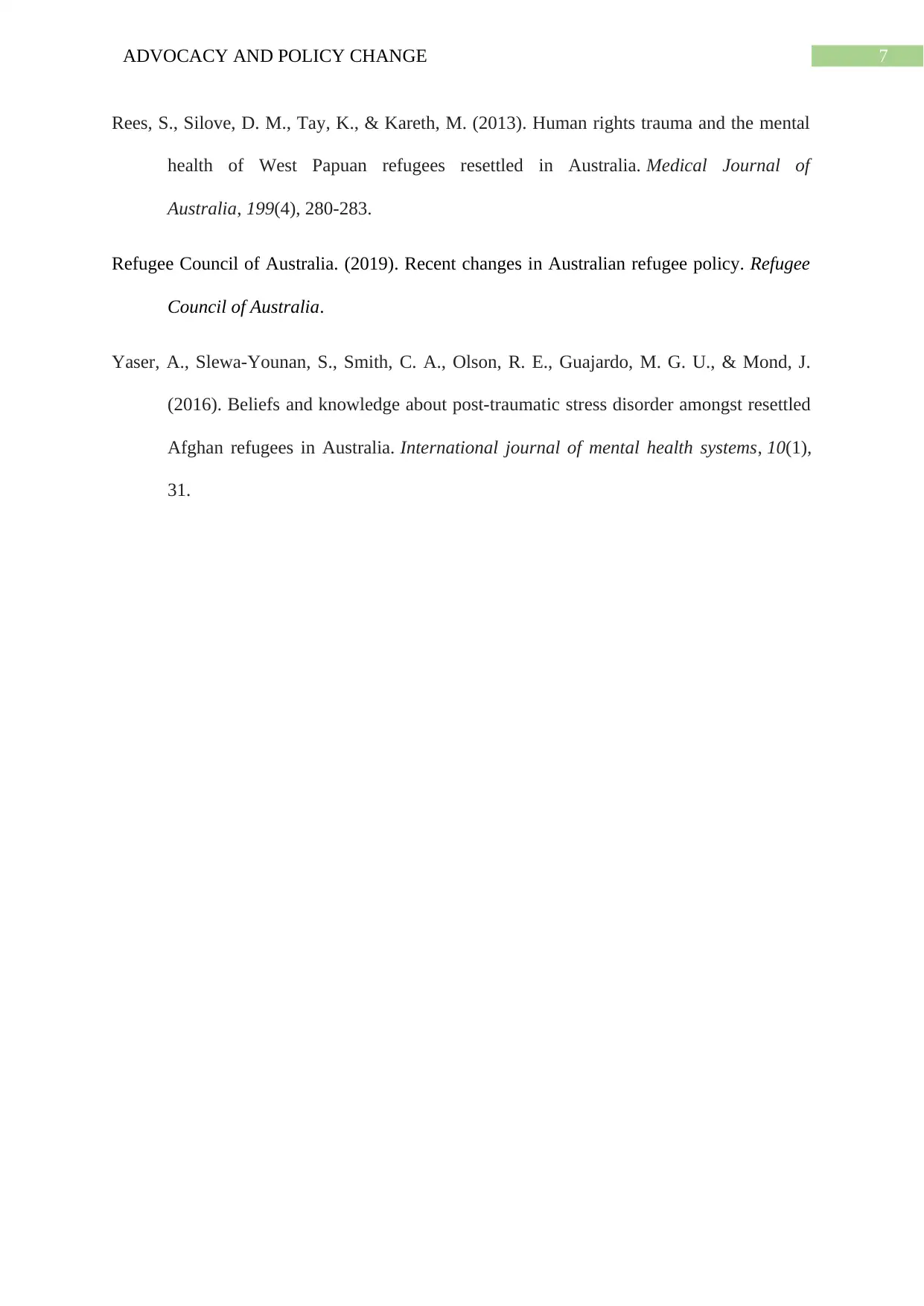
7ADVOCACY AND POLICY CHANGE
Rees, S., Silove, D. M., Tay, K., & Kareth, M. (2013). Human rights trauma and the mental
health of West Papuan refugees resettled in Australia. Medical Journal of
Australia, 199(4), 280-283.
Refugee Council of Australia. (2019). Recent changes in Australian refugee policy. Refugee
Council of Australia.
Yaser, A., Slewa-Younan, S., Smith, C. A., Olson, R. E., Guajardo, M. G. U., & Mond, J.
(2016). Beliefs and knowledge about post-traumatic stress disorder amongst resettled
Afghan refugees in Australia. International journal of mental health systems, 10(1),
31.
Rees, S., Silove, D. M., Tay, K., & Kareth, M. (2013). Human rights trauma and the mental
health of West Papuan refugees resettled in Australia. Medical Journal of
Australia, 199(4), 280-283.
Refugee Council of Australia. (2019). Recent changes in Australian refugee policy. Refugee
Council of Australia.
Yaser, A., Slewa-Younan, S., Smith, C. A., Olson, R. E., Guajardo, M. G. U., & Mond, J.
(2016). Beliefs and knowledge about post-traumatic stress disorder amongst resettled
Afghan refugees in Australia. International journal of mental health systems, 10(1),
31.
1 out of 8
Related Documents
Your All-in-One AI-Powered Toolkit for Academic Success.
+13062052269
info@desklib.com
Available 24*7 on WhatsApp / Email
![[object Object]](/_next/static/media/star-bottom.7253800d.svg)
Unlock your academic potential
Copyright © 2020–2026 A2Z Services. All Rights Reserved. Developed and managed by ZUCOL.





